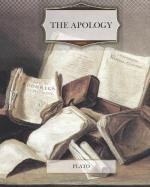|
|
The Apology The Penalty is Death
"Well, gentlemen, for the sake of a very small gain in time you are going to earn the reputation--and the blame from those who wish to disparage our city--of having put Socrates to death." Line 38c He says that had they waited a short period of time, he would have died a natural death and they would not have to live with condemning him.
He now addresses those people who voted for his execution and says that he does not doubt that they condemned him for the lack of arguments he used. He realizes that there are many things he could have said and done which would have ensured his acquittal. However, it is not that he refused to do these things that made them condemn him, it is that he refused to address them in the manner they wished to be addressed, and to plead and weep for his acquittal, as many people do who stand trial. Despite this, he does not regret the way he acted, for at least he was truthful. Furthermore, he believes that nobody should use wits to escape death, regardless of the situation--whether it is court or warfare. This is because he believes that escaping death is not difficult, it is escaping wickedness that is.
He says:
"When I leave this court I shall go away condemned by you to death, but they will go away convicted by Truth herself of depravity andwickedness. And they accept their sentence even as I accept mine." Line 39b
Having said this, Socrates feels moved to prophesy to those who voted to condemn him and says that as soon as he is dead, vengeance shall fall upon them and their punishment shall be far greater than that they condemned him with. They brought about his death in the belief that through this, they will rid themselves of the criticisms of their lives.
However, they do not realize that he has restrained many other people from criticizing them, most of who are younger than he and more energetic, and will criticize them more than he did. Thus, they accomplished the opposite of their goal. The only way to stop people criticizing from them is to improve their lives to the best of their abilities.
He also gave a few words of reconciliation to those that voted for his acquittal by saying that his experience has been truly remarkable. In the past, whenever he was following a wrong path, no matter how great or small, a prophetic voice would redirect him. However, throughout this trial, he has not heard that voice once. This can only mean that this is a blessing. He considers this to be true for death can be one of two things: an endless sleep or a migration of the soul to another place.
If it is the first, death must be a 'marvelous gain' as a dreamless sleep for eternity would be the most restful experience ever. As for the alternative, that all that are dead are there, this would be a great blessing for one would meet all the great people and demi-gods and converse with them freely. "[A]bove all I should like to spend my time there, as here, in examining and searching people's minds, to find out who is really wise among them, and who only thinks that he is." Line 41b.
Anyway, he could not be put to death there for such conduct, because everybody there is immortal. He says that all who believe him should also look forward to death with confidence, and have one belief fixed in their mind: that a good man cannot be harmed in life or in death.
Topic Tracking: Death 14
Topic Tracking: Death 15
He does know, however, that it is time for him to die. Otherwise, his sign would have turned him back and changed his course of conduct. He does not bear any grudges against those who condemned him, although they were trying to hurt him. However, he does ask them to grant him one favor: when his sons grow up, please correct them as he corrected those who condemned him, and do not let them put their money or anything else before their goodness, or neglect the important things in life. He asks them to take their revenge by plaguing them as he plagued these people, and criticizing them as he criticized this society. In that manner, they would have served him justice.
"Now it is time that we were going, I to die and you to live; but which of us has the happier prospect is unknown to anyone but God." Line 42a



